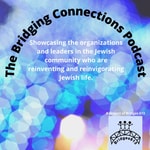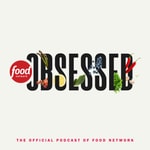The Bridging Connections Podcast – Details, episodes & analysis
Podcast details
Technical and general information from the podcast's RSS feed.

The Bridging Connections Podcast
Bridges 613
Frequency: 1 episode/17d. Total Eps: 69

Recent rankings
Latest chart positions across Apple Podcasts and Spotify rankings.
Apple Podcasts
🇺🇸 USA - religion
28/06/2025#88🇩🇪 Germany - religion
09/04/2025#86🇩🇪 Germany - religion
08/04/2025#71🇺🇸 USA - religion
05/12/2024#98
Spotify
No recent rankings available
Shared links between episodes and podcasts
Links found in episode descriptions and other podcasts that share them.
See all- https://www.jewishspirituality.org/
95 shares
- https://www.bridges613.org/donate
69 shares
- http://www.bridges613.org/
69 shares
RSS feed quality and score
Technical evaluation of the podcast's RSS feed quality and structure.
See allScore global : 62%
Publication history
Monthly episode publishing history over the past years.
Jewish Engagement Through Farmers / Modern Farmers Ancient Wisdom
Season 4 · Episode 69
vendredi 26 mai 2023 • Duration 36:45
Jewish Farmers Network (JFN)
Featuring: Shani Minsk, Co-Founder and Executive Director
Jewish Farmer Network mobilizes Jewish agricultural wisdom to build a more just and regenerative food system for all. We connect Jewish farmers to each other and to the surprisingly relevant technologies, rhythms, and ethics of Jewish agriculture. We believe that a vibrant future for people, plants, and planet will be shaped by farmers, gardeners, and growers of all kinds. We are the AND that connects your story to the story of the Jewish people.
Their Mission :
Jewish Farmer Network supports the economic, social, and cultural vibrancy of Jewish agriculture by connecting Jewish farmers to resources and community around the world. We mobilize Jewish wisdom to build a more just and regenerative food system for all.
Their vision
We are building a world in which Jewish farmers are not regarded as an oxymoron or a curiosity, but rather, as valued community members with a unique connection to Judaism's ancient technologies for building a more just and regenerative food system for all. We envision a world in which all Jewish individuals and communities have access to farms and gardens that connect them to both the agricultural roots of Judaism and the timeless food justice principles contained therein. We envision a world in which any Jewish individual with the desire to both live a land-based life and be a part of Jewish community life has the technical, economic, social, and cultural resources to do so. We envision a world of social and ecological justice, where life in all forms is honored. We envision a world in which Jewish Farmers are a collaborative force for the collective liberation of all land and all peoples.
Thank you for tuning in to The Bridging Connections podcast. Please partner with us to promote this important work. Follow us on Facebook, Instagram or visit our website at www.bridges613.org for exciting news about innovation in Jewish life. This work depends on your feedback and donations. Please consider leaving feedback and or making on donation. We are grateful for all your support.
Ethical Treatment of Animals
Season 4 · Episode 68
vendredi 5 mai 2023 • Duration 45:58
JIFA: Jewish Initiative for Animals
Featuring: Rabbi Jonathan Bernhard, Executive Director and Melissa Hoffman, Director of Programs
The Jewish Initiative for Animals supports innovative programs to turn the Jewish value of compassion for animals into action while building ethical and sustainable Jewish American communities in the process.
Jewish tradition urges us to keep a healthy skepticism about the sourcing of our goods and strive for ethical consumption. JIFA is ready to work with your community to help you establish your own values-based food practices.
We support Jewish community education for all ages through curriculum development, direct teaching, and partnerships with organizations that disseminate materials and promote learning about Jewish values and our food system.
JIFA’s Values:
Promoting compassion and preventing suffering to animals — in Jewish tradition, a core value called tza’ar ba’alei chayim (literally: the suffering of living creatures) — is central to our work to build a better food system
- Climate and the environment - Bal tashchit and sh’mirat ha’adamah — the prohibition against destruction/waste and the imperative to protect our Earth — are cornerstones of JIFA’s work to end factory farming.
- Food justice- We find our most ancient model for food justice in the laws of shmita, which Jewish communities have revived with renewed significance in recent years
- Racial justice - We know that the structures that perpetuate factory farming are inextricably linked with those that perpetuate racist oppression and violence. To create meaningful change in our food system we must also help to build an anti-racist animal protection movement.
- Inclusivity- Reflecting broadly held values — and serving food that everyone can eat — promotes inclusivity in gatherings and strengthens our Jewish community
- Kosher- Kosher is a quintessentially Jewish concept to describe what is “fit,” including the food we eat
Thank you for tuning in to The Bridging Connections podcast. Please partner with us to promote this important work. Follow us on Facebook, Instagram or visit our website at www.bridges613.org for exciting news about innovation in Jewish life. This work depends on your feedback and donations. Please consider leaving feedback and or making on donation. We are grateful for all your support.
Healing in the Wilderness
Season 3 · Episode 59
vendredi 21 octobre 2022 • Duration 31:55
BaMidbar
Featuring: Jory Hanselman Mayschak, Founder and CEO
Through a variety of modalities, BaMidbar supports mental health and wellness and envisions a Jewish community that actively supports its members in building the resilience to thrive.
BaMidbar has a 6-14 week summer residential therapeutic program that focuses on using the environment to support skill building and self exploration while bringing in Jewish tradition and storytelling to explore meaning, values and purpose. They employ a multidisciplinary approach which integrates experiential education, Jewish learning, and mental health frameworks. Bamidbar focuses on four core outcomes:
- Improve mental health
- Boost resilience
- Strengthen circle of support (family, peers, mental health professionals)
- Increase understanding of how Judaism supports mental well being
Additionally, BaMidbar offers mental health and wellness retreats, fellowships and internships and partners with a variety of organizations to offer prevention programs, and create custom programs. Their programs are based on prevention, education and treatment.
BaMidbar’s mission is to ensure that Jewish youth and young adults have the confidence, skills, and community support to navigate life’s challenges and thrive in the face of adversity.
BaMidbar envisions a Jewish community that actively supports its members in cultivating mental health and wellness.
They achieve the mission and vision through community education and by providing wilderness-based journeys of self-discovery, hope, and healing.
Their programs support and provide:
- Jewish young adults struggling with mental health challenges through immersive, wilderness-based, Therapeutic Expeditions.
- All Jewish teens and young adults, regardless of their mental health history, through Wellness Programs focused on building resilience through increased self-confidence, skill-building, and healthy relationships.
- Professional Development for Jewish community professionals looking to expand their mental health literacy and explore facilitation through the lens of social and emotional growth.
Thank you for tuning in to The Bridging Connections podcast. Please partner with us to promote this important work. Follow us on Facebook, Instagram or visit our website at www.bridges613.org for exciting news about innovation in Jewish life. This work depends on your feedback and donations. Please consider leaving feedback and or making on donation. We are grateful for all your support.
Baking Bread As An Act of Love
Season 3 · Episode 58
vendredi 7 octobre 2022 • Duration 39:06
Featuring: CoFounders Sara Loffman and Marni Loffman
It’s amazing what beautiful things can come out of uncertainty and isolation. The four Loffman Siblings, Elana, Hannah, Marni and Sara, found themselves all back at home together at the beginning of the pandemic. This togetherness brought them to baking challah. Although the challah was initially for family and friends it soon turned into making food and challah for the hard working health care teams in the emergency rooms.
They quickly realized that they had a marketable skill although they didn’t feel right to start a business at such an ominous time. The siblings saw the need to help change the landscape of our country and work toward a more equitable world. They felt called to do their part in the struggle for racial justice; to stand up for diversity, equity and inclusion. Hence, Challah Back Girls was formed. Challah Back Girls has become a symbol of ritual and togetherness. “Each strand of challah makes up a different layers of who each of us are, all the strands of challah come together as one., explains Sara. Now challah is shared weekly across the states in an effort to support those working toward social equality and racial justice. The Challah Back Girls work to amplify the voices of organizations that are advancing word and therefore living the value of tikkun olam.
The Loffmans were raised on values of community and shared food combined with Jewish observance and Jewish connectedness. Their family life was based on sharing meaningful moments around Jewish holidays and traditions. This makes for a seamless transition to creating this platform of education, awareness raising and advocacy through challah.
The Mission
Challah Back Girls fundraises for, supports, and uplifts organizations leading racial equity work by connecting people to the Jewish ritual of challah—a traditionally braided bread. Through sharing this Jewish tradition, we provide an educational opportunity for healing and transforming social and racial injustice.
The Vision
Our dream is to create collaboration and mutual support across minority communities through the power of food and ritual. We hope to use Challah as a thread that weaves together people from diverse backgrounds, so we can share histories and stories, to support and amplify each other’s work for social change.
Enjoy 20% off delicious challah between now and Oct 31st with the code CHALLAHBRIDGES.
Thank you for tuning in to The Bridging Connections podcast. Please partner with us to promote this important work. Follow us on Facebook, Instagram or visit our website at www.bridges613.org for exciting news about innovation in Jewish life. This work depends on your feedback and donations. Please consider leaving feedback and or making on donation. We are grateful for all your support.
The Kibbutz Reimagined
Season 3 · Episode 57
vendredi 30 septembre 2022 • Duration 44:30
Living Tree Alliance
Featuring: Co-Founders Koehenet Sephira Oshkello and Melanie Kessler
Meaningful Earth-Based Living
Living Tree is a modern kibbutz-inspired community designed for joyful, adventurous earth-based living in Vermont’s great outdoors. They are a cohousing curator, event producer, and education center dedicated to connecting participants to self, community, earth and spirit through homesteading, camping, celebrations, festivals and enrichment programs. They welcome residents, guests, students, families, and groups of all ages and backgrounds.
Their mission is to create, evolve, and manage a thriving earth-based intentional community with universal Jewish values for individuals and families of all backgrounds seeking greater connection, meaning and purpose in life.
The Seven Pillars of Living Tree Alliance: Decisions and actions in all circles of their organization are grounded in these principles.
1. Regenerative Resiliency
We prioritize our ecological community in our thinking, acting and reflecting.
2. Service
We practice tzedakah (charity) and gemilut chassidim (acts of loving kindness) in work, hospitality, and economy.
3. Social Justice
We are informed by Jewish ethics and are committed to education, civic engagement and nonviolent communication.
4. Inner Work
We bring mindfulness, compassion & understanding to the cultivation of emotional, mental, physical, & spiritual well being.
5. Joy, Gratitude, and Celebration
We keep time to appreciate life each day, refrain from work on Shabbat and celebrate life cycle events with joy.
Thank you for tuning in to The Bridging Connections podcast. Please partner with us to promote this important work. Follow us on Facebook, Instagram or visit our website at www.bridges613.org for exciting news about innovation in Jewish life. This work depends on your feedback and donations. Please consider leaving feedback and or making on donation. We are grateful for all your support.
Tzedakah at Its Best
Season 3 · Episode 56
vendredi 9 septembre 2022 • Duration 24:23
Jewish Free Loan Chicago
Featuring: Leah Greenblum, Founder and Executive Director
In the Middle Ages Moises Maimonides (1), great philosopher, physician and rabbi, outlined eight levels of tzedakah (charitable giving). He describe the highest form of giving is to give a gift, loan, or partnership that will result in the recipient becoming self-sufficient instead of living upon others. Jewish Free Loan Chicago is embodying this level of giving in an effort to engage people to help those in need.
Jewish Free Loan Chicago’s mission is to help Chicagoans discover small personal loans with zero-interest, in an effort to cut out the need for predatory lending, often in the form of risky payday loans and car title loans.
At Jewish Free Loan Chicago, people of all backgrounds can discover personal loans that are fast, easy, and accessible to anyone in the Chicagoland area.
What is a Jewish Free Loan?
An age-old tradition recrafted for the 21st century, a Jewish free loan is a small personal loan that is interest-free and can be paid back on a timeline that meets each borrower’s individual needs.
Where do interest-free loans come from?
Rooted in teachings from the Torah and sages, Jewish free loans are a time-honored tradition in the U.S. and beyond. In fact, most U.S. cities play host to at least one Jewish or Hebrew Free Loan agency. Unlike JFLC, some Jewish loan societies cater only to the needs of the Jewish community and do not have income caps. JFLC serves low- to moderate-income people of all backgrounds who need access to capital.
Loan Possibilities
JFLC borrowers’ financial status can be wide-ranging, and their potential financial needs can also run the gamut, including:
- General expenses: transportation, technology, and debt consolidation
- Employment: job-search, initial costs (transportation/relocation), job training
- Healthcare: medical, mental, and dental
- Women & children: childcare, education, fertility, adoption
- Legal fees: divorce, immigration, discrimination
- Education: tuition, supplies
Jewish Free Loan Chicago is part of the International Association of Jewish Free Loans, a large network of 50 related organizations.
- https://www.jewishvirtuallibrary.org/moses-maimonides-rambam
Thank you for tuning in to The Bridging Connections podcast. Please partner with us to promote this important work. Follow us on Facebook, Instagram or visit our website at www.bridges613.org for exciting news about innovation in Jewish life. This work depends on your feedback and donations. Please consider leaving feedback and or making on donation. We are grateful for all your support.
Living Well
Season 3 · Episode 55
vendredi 26 août 2022 • Duration 30:23
Shomer Collective
Featuring: Rabbi Melanie Levav, Executive Director
Inspiring End-of-Life Conversations and Experiences, Guided by Jewish Values
Who am I? What’s the meaning of life? What’s my legacy? What do I have left in the next portion in my life? These are all age old questions. Quite possible you have contemplated some of these in during your lifetime. These are questions that our sages have questioning for years. There is deep Jewish wisdom that we can find from the sages that will help us decipher some of these questions for ourselves. This helps us realize that we are not alone.
Shomer Collective’s mission is to improve end-of-life experiences for individuals and their families— inspired by Jewish wisdom, values, and practices—by curating content and resources and building a diverse network of organizational partners.
Shomer Collective envisions a world where end-of-life matters are spoken about openly, thoughtfully and frequently creating more opportunities for folks to engage with Jewish wisdom values and practices. Having these conversations and experiences can be transformational not only for the individual but also the whole family.
In the Jewish tradition we say to mourners “May you be comforted among the other mourners.” This reminds us that you are not sitting shiva alone, you’re part of the interconnected community that goes beyond the shiva house.
They do this through 4 roles: concierge, curator, convenor and change agent. Through the roles they hope to:
- Empower individuals as they plan for and/or confront death for themselves and loved ones.
- Make Jewish wisdom and expertise in end-of-life matters more accessible through referrals, teaching, counseling, and curation of learning experiences.
- Spark innovation and culture change inside and beyond Jewish institutions, so that organizations will recognize that end of life is a lifecycle moment that can meaningfully engage people Jewishly.
The word Shomer means guardian; in Jewish tradition, a shomer guards over the body of the deceased from the time of death until the time of burial, accompanying the soul on the beginning of its journey in separating from the body. Shomer Collective seeks to accompany individuals and families as they confront and plan for end of life by curating partners and resources that lift up Jewish wisdom, values, and practices.
Shomer Collective offers concierge services to help you navigate all things end of life, Jewishly. We curate the most accessible resources to help you find what you need when you need it, whether it’s a Jewish how-to video about end-of-life rituals or a link to a Jewish funeral home in your area.
Thank you for tuning in to The Bridging Connections podcast. Please partner with us to promote this important work. Follow us on Facebook, Instagram or visit our website at www.bridges613.org for exciting news about innovation in Jewish life. This work depends on your feedback and donations. Please consider leaving feedback and or making on donation. We are grateful for all your support.
Cultivating Leaders, Nourishing Communities
Season 3 · Episode 54
vendredi 12 août 2022 • Duration 34:35
Nazun (formerly Challah for Hunger)
Featuring: Rebecca Bar, Executive Director and Rabbi Lily Solochek, Director of Programs and Education
Food insecurity is prevalent throughout the United States. According to the USDA over 10% of American families were food insecure in 2019 and it is estimated that this has doubled since the onset of Covid. This is also a problem on our nation’s college campuses. According to the Hope Survey from fall 2020, 38 percent of students in two-year colleges and 29 percent of students at four-year colleges reported experiencing food insecurity. These statistics are disturbing. Nazun is doing the important work to help end campus food insecurity and educate leaders in social justice advocacy. Episode 54 of the podcast is a conversation with with Nazun’s leadership. It is eye-opening and at the same time, it gives hope.
About Nazon (from their website)
Mission + Vision
Nazun develops leaders and builds communities of people eager to take action to end campus hunger, and to work collectively to solve other urgent social challenges.
One in three college students experiences food insecurity; they don’t know where their next meal might come from and don’t have the resources, time or money to afford access to nutritious food. We are on a mission to ensure that no student ever has to choose between eating or an education. We work to destigmatize — and empower people to act against — the highly prevalent problem of food insecurity on college campuses.
Our work reduces the likelihood that college students will have to choose between eating or their education, and it also builds the next generation of confident leaders capable of contributing to solving the world’s most urgent social challenges.
The three pillars of Nazun are infused into all our projects: Advocacy, Community, and Philanthropy.
Their Programs:
1. Campus Chapters: The Focus: Campus Hunger- Through Nazun’s program, our student leaders address the issue of campus food insecurity on a campus, state, and national level through our three pillars of philanthropy, advocacy, and community building. Our Cohort, a select group of student leaders, annually creates and implements campaigns and interventions on their campuses to address the issue of campus food insecurity.
2. Advocacy - The #FUELHigherEd program is advocating for fundamental, universal, equitable, long-term state and federal solutions to campus hunger and #FUELHigherEd by working toward
- Fundamental Change
- Universal Access
- Equal Opportunity
- Long Term Solution
3. This program is the next step in building our movement by galvanizing our network of 100+ local and national organizations behind this campaign.
4. Community Programs
5. Through a Nazun Community Program, you and your community can gather to build connections through baking challah, learn about and advocate against hunger in your local area and on college campuses, and engage in philanthropy to support the work of Nazun and local anti-hunger nonprofits in your neighborhood.
Thank you for tuning in to The Bridging Connections podcast. Please partner with us to promote this important work. Follow us on Facebook, Instagram or visit our website at www.bridges613.org for exciting news about innovation in Jewish life. This work depends on your feedback and donations. Please consider leaving feedback and or making on donation. We are grateful for all your support.
Find Your People and Your Place
Season 3 · Episode 53
vendredi 29 juillet 2022 • Duration 23:38
GatherDC
Featuring: Alexandra Tureau, Managing Director
GatherDC’s Mission and Vision
GatherDC helps Jewish 20s/30s connect to Jewish life and to each other.
GatherDC is a Jewish nonprofit that serves as the one-stop-shop for everything 20s and 30s need to live their best Jewish life. Whether you’re looking for Jewish events, people, synagogues, housing, jobs, rabbis, kosher food, or anything in between – we connect you.
We are here to make it easy for you to find your people and place in DC and NOVA Jewish life. Whether you’re looking for Jewish events, people, housing, jobs, rabbis, kosher food – we’ll connect you!
We envision a future where every Jewish 20- and 30-something finds a lasting, compelling connection to Judaism.
HOW DO WE GATHER? -
- We form personal relationships with thousands of 20s/30s and introduce them to a vast network of DC-area young adults.
- We create curated experiences to reach uninvolved young adults across Jewish DC/NoVA.
- We lead thought-provoking Jewish learning experiences that inspire a relevant, active, and meaningful connection to Judaism.
- We provide a comprehensive online list of local events, jobs, kosher food, housing, rabbis and more that make it easy for young adults to find their fit in the Jewish community.
- We meet young Jewish adults where they are, regardless of their future plans for marriage, children, or synagogue.
- We serve as the pulse of the community, connecting 20s/30s to the Jewish life that is right for them.*
*from GatherDc’s webpage
Thank you for tuning in to The Bridging Connections podcast. Please partner with us to promote this important work. Follow us on Facebook, Instagram or visit our website at www.bridges613.org for exciting news about innovation in Jewish life. This work depends on your feedback and donations. Please consider leaving feedback and or making on donation. We are grateful for all your support.
Making Mikvah Meaningful
Season 3 · Episode 52
lundi 18 juillet 2022 • Duration 35:47
The Eden Center
Featuring: Dr. Naomi Marmon Grumet, Founder & Executive Director
Jewish identity is based on three foundations, according to Dr. Naomi Marmon Grumet, the Sabbath, the laws of kashrut and mikvah, ritual bath. In fact, our sages tell us that it is incumbent on a community to build a mikvah before building any other communal structure including a synagogue. They say that it is so important a community should sell a Torah scroll to acquire the funds for the construction of a mikvah. (Rabbi Naftali Tzvi Yehuda Berlin, Meshiv Dabar, 1:45 and Rabbi Shneur Zalman Lesches. "understanding Mikvah"). This helps us to understand the importance our rabbis placed on the rituals and laws surrounding ritual immersion. If mikvah is of such importance, it must serve a sacred role to protect women both emotionally and physically.
During her university studies, Naomi was interested in women’s connections to Judaism. She recognized that Shabbat lighting candles, baking challah and going to the mikvah are the three major mitzvot that are specifically incumbent on women. Of those three, she know the least about the laws regarding mikvah and choose to study this mitzvah deeply. From her intense studies and numerous conversation, The Eden Center was born.
Their Mission
The Eden Center focuses on enabling all women to have a personally meaningful and welcoming experience in the mikveh, providing support and resources for crisis and lifecycle moments and transforming the mikveh into a vehicle to promote women’s emotional and physical health, intimacy and well-being.
Their Story
For millennia, the mikveh was the pivotal institution for Jewish women, and considered central to Jewish family continuity. It provided women with a sense of connection and time for introspection and spiritual intimacy. Today, however, mikveh has lost meaning for many women and has even become a source of discomfort and alienation. Even among traditional and religiously committed women, research shows that increasing numbers stop immersing after negative experiences. The disrepair of many mikvaot in Israel sends the implicit message that Jewish women are not valued. Moreover, many non-religious women, who encounter the mikveh as a state-ordained marriage requirement, become hostile toward Judaism and religious authority as a result of their experience. This makes Eden’s mission to make mikveh welcoming and relevant for modern women all the more imperative. The Eden Center imagines the mikveh as a focal point for addressing a variety of dynamics related to the Jewish woman and family, including but not limited to:
- Promoting tolerance and inclusiveness;
- Promoting women’s mental and physical health;
- Using the mikveh as a tool that connects women to sources of support within the community
- Empowering women and enabling meaningful religious, spiritual and personal experiences;
- Increasing public awareness of issues of women’s health and women’s well-being, including encouraging the intimate female voice in the context of marital relationships;
- Allowing all wome
Thank you for tuning in to The Bridging Connections podcast. Please partner with us to promote this important work. Follow us on Facebook, Instagram or visit our website at www.bridges613.org for exciting news about innovation in Jewish life. This work depends on your feedback and donations. Please consider leaving feedback and or making on donation. We are grateful for all your support.









